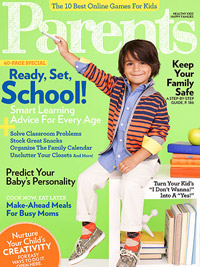
Parents are often concerned about “brain boosters” and “school preparedness”. Part of my mission is to alleviate some of the pressure and stress we place on ourselves and encourage everyone to pursue the educational opportunities in our everyday enjoyment of life with our children.
I welcome the opportunity to share my educational philosophy and some of the latest studies that show that reading aloud, play, outdoor exploration, and creative expression, along with plenty of love and healthy food, of course, are the building blocks of later academic learning.
In the “As They Grow: 1-2 Years” section of Parents magazine, I am quoted on the topic of “Help your kids get ready for preschool”:
“One of the most effective and proven ways to build literacy is reading aloud,” says Candace Lindemann, a curriculum designer and owner of Naturally Educational, a consulting firm. Do it cuddled up together in a comfy chair: “That way your toddler will associate reading with having your positive attention and her interest will grow,” Lindemann notes.
Over time, you might begin to notice that she begins to remember the sequence of a beloved book. After that, she’ll realize that the squiggles on the page are symbols that have meaning, which is the first step on the road to reading, Lindemann notes.
“Children are natural experimenters. Your questions will lead your toddler to form a hypothesis, predict what might happen, and observe the results,” says Lindemann. “Later in life, as he learns more complicated information and concepts, there will be a foundation of experience to which this knowledge will stick.”
“Researchers have found that learning to play music–even just banging on pots and pans–fosters a child’s development in a huge way,” says Lindemann. After all, it encourages self-expression and teaches rhythm and beat counting. “Fractions will eventually come more naturally to a child who has mimicked rhythms on instruments or through song,” notes Lindemann. What’s more, dancing to music and playing an instrument build coordination and motor development.
I’ll link the entire article when/if they put it on the website next month–right now you can check it out at magazine stands in the September 2011 issue of Parents.
Congrats! What an honor. I read that article (before seeing it here) and thought it was practicable. Nice job.